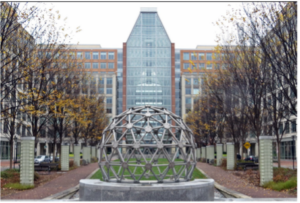 On Friday, December 17, the Cyberlaw Clinic filed an amicus brief in the United States Supreme Court on behalf of Engine Advocacy (“Engine”), the Public Interest Patent Law Institute (“PIPLI”), and ACT | the App Association. The brief supports Apple’s petition for a writ of certiorari in the case, Apple v. Qualcomm. Apple is asking that the Supreme Court review a decision of the United States Court of Appeals or the Federal Circuit, which held that Apple lacked standing to challenge the validity of patents that it licensed from Qualcomm.
On Friday, December 17, the Cyberlaw Clinic filed an amicus brief in the United States Supreme Court on behalf of Engine Advocacy (“Engine”), the Public Interest Patent Law Institute (“PIPLI”), and ACT | the App Association. The brief supports Apple’s petition for a writ of certiorari in the case, Apple v. Qualcomm. Apple is asking that the Supreme Court review a decision of the United States Court of Appeals or the Federal Circuit, which held that Apple lacked standing to challenge the validity of patents that it licensed from Qualcomm.
The Federal Circuit decision in question arose from Apple’s efforts to invalidate two patents that Qualcomm licensed to Apple as part of a large patent portfolio. Apple proceeded via inter partes review (“IPR”) before the Patent Trial and Appeal Board (“PTAB”), and then sought to appeal the PTAB’s decisions to the Federal Circuit. Congress created IPR to weed out invalid patents and specifically granted a broad right of appeal in order to encourage entities to use this system. Nevertheless, the Federal Circuit held that Apple lacked Article III standing to challenge the PTAB’s decision, because invalidation of the two patents would not in and of itself affect Apple’s payment obligations under the portfolio license agreement.
As set forth in the brief, the Federal Circuit’s exceedingly narrow approach to standing significantly and improperly inhibits the ability of licensees to improve patent quality by challenging questionable patents through IPR (and, if necessary, appealing PTAB decisions to the Federal Circuit). As amici note in the brief:
The practical consequences of these Federal Circuit cases are stark. Startups, small businesses, and the broader public bear the burden of wrongly-granted patents which unjustly obstruct innovation, competition, and access to technology. Invalid patents impose these harms even absent pending or imminent litigation. Successful patent challenges eliminate the injurious effects of invalid patent broadly, not just for the party instituting review.
Fall 2021 Cyberlaw Clinic students Falicia Elenberg and Anthony Pericolo worked on the brief, collaborating closely with Abby Rives from Engine and Alex Moss from PIPLI and with HLS Clinical Professor Christopher Bavitz. A decision from SCOTUS about whether to address the case on the merits is expected in the new year.
“U.S. Patent and Trademark Office” image by Flickr User Alan Kotok, CC BY 2.0, available at https://www.flickr.com/photos/runneralan/10918850254.
